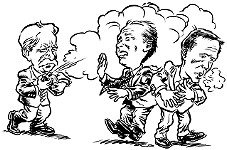The Public as Afterthought
Not an Athenian Democracy
By Alex de Marban, Fri., Aug. 16, 1996
A telling vignette occurred recently, during depositions in a lawsuit brought against the mayor by environmentalist Karen Hadden. Last year Todd had indefinitely barred Hadden from attending council meetings because she once blew a whistle at a council work session. Hadden claims Todd violated the Texas Open Meetings Act. On July 27, Jim Harrington, of the Texas Civil Rights Project, deposed Todd. According to Harrington, an "obnoxious" Todd would not directly respond to the majority of the questions; perhaps that is because, as Harrington noted, Todd was busy doodling throughout the session.
But the mayor's apparent disregard for public input spreads beyond his dislike for Hadden, and takes on even greater magnitude now that he is attempting to peddle more than half of the city's revenue-generating departments to the private sector. Privatization means less public accountability, and as Ronney Reynolds noted during last Thursday's discussion on whether to privatize the Austin Convention and Visitors Bureau (ACVB), "If we're going to have this entity be [accountable to the] public, there's no sense in it moving [to the private sector]."
Todd undoubtedly agrees. When staff's original proposal to privatize the ACVB first came to the council two weeks ago, Todd expressed no concerns with the plan's blanket lack of public accountability. Never mind that the private non-profit board that would handle ACVB's duties -- which is selling Austin to tourists -- would be eligible for $1.9 million in taxpayer funding. And never mind that the last time the ACVB was in private hands, an audit found that few records were kept. But even worse, Todd apparently didn't mind that staff's proposed bylaws for the corporation didn't mention the Open Meetings Act at all. And he expressed no qualms that public involvement would be limited to only four meetings a year.
The liberal majority -- led by Daryl Slusher and Jackie Goodman -- refused to accept the bylaws without additional safeguards. Goodman spent a generous part of the following week trying to negotiate changes with city staff, but most were relatively trivial, like expanding the notification time for meetings.
For the most part, the revamped proposal is still wrought with measures to avoid the public. While Goodman did persuade staff to include the Texas Open Meetings Act (TOMA), she bowed to their excuse that neighboring cities like Round Rock could eavesdrop and steal ACVB's marketing plans. Thus, TOMA non-compliance is forgiveable if the board meets to discuss competitive strategy. Since the group won't do much else, Goodman's efforts could be fruitless.
Moreover, the proposal allows the creation of a smaller executive committee made up of the non-profit board's directors. Most of the power will reside here. The committee will have the same authority the board does, and needs no board approval for any action. The bylaws do not require that the executive committee adhere to the TOMA. Goodman intended to check the executive committee's power by allowing board meetings with only one-third of the members present. Goodman says that would allow the board to overturn actions of the executive committee. But since the executive committee has the same power as the board, Goodman's check is apparently meaningless. Moreover, she forgot to change the key clause -- the board can change the bylaws with only a rubber stamp from the city manager. Though Goodman labored so valiantly, it's kind of like building a house along the San Andreas Fault. But now she says she'll change that part of the bylaws to require city council approval instead. Which helps explain why she went ahead and joined Garcia, Todd and Reynolds in approving the proposal on first reading. Griffith and Mitchell abstained, Slusher dissented, and the proposal passed, 4-1. It'll be back for second and third readings.
n
Needless to say, Todd also didn't favor Slusher's proposal to limit staff briefings in executive session (secret meetings), unless a "super-majority" of five councilmembers approves of the secret briefing.
Speculation that Todd uses the briefings to keep the public out of the process is nothing new. For example, closed-door staff briefings were the primary vehicle for secrecy during Todd's last attempt to force Freeport McMoRan's Barton Creek development agreement down the public's throat. The entire proposal developed behind closed doors, and was leaked to the public only a week before the vote. At the time, former councilmember Brigid Shea warned that Todd and Freeport were improperly using the executive session to hoodwink the public.
During last Thursday's discussion, Todd and Reynolds attempted two main arguments. First, that staff would still brief the council privately, no longer as a group meeting, but one-on-one with councilmembers. "This effort for openness will result in more closed meetings," said Reynolds.
The two also claimed that councils in other cities hold fewer private staff briefings because they don't manage an electric utility; most of Austin's staff briefings were about the city-owned utility. The duo claimed that San Antonio's city council holds few staff briefings because the public authority board, not the council, manages their utility. It should be noted, however, that San Antonio's authority board itself doesn't hold closed-door briefings.
With their arguments making no headway, Todd and Reynolds affirmed their belief in the public's right to know, though they hardly seemed sincere. That's because the proposed five-vote "super-majority" offered an escape route. They were still able to claim that they didn't mind having to vote before being allowed to go into executive session, but they argued that only four votes should be required. "Last time I checked we were in a democracy and majority rules," Reynolds stated. But no one on the council really believed them, and the four liberals enacted Slusher's proposal. Reynolds abstained; Todd and Mitchell voted "No."
n
This week in council: The council will vote on an amendment to the Composite II water quality ordinance that would make it impossible to enforce SOS retroactively. Staff is also attempting to remove a phrase from the Composite II ordinance that leaves it in effect "pending a final judgement and exhaustion of all appeals" in the SOS lawsuit (See "Naked City," p.18, for details). Also, a public hearing at 5:30pm on the city's operating and capital budget. Next week on August 22 at 6:30pm, there will be another public hearing on privatizing the health care clinics.n
Got something to say on the subject? Send a letter to the editor.








